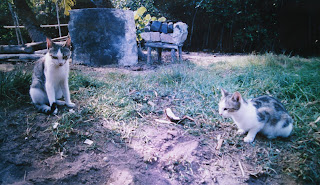Hunting crabs
With the sea on one side of our camp and areas of saltwater swamp on most other sides we would regularly get inundated by crabs. Active at night they would scuttle over our sand paths, sometimes finding their way into our sleeping bure to wake us up and chew big holes through all of our clothes
Unfortunately, for them, they were also often on the menu for our local Fijians (boiled up and served in a delicious sauce made from coconut and onion), and sometimes big bags of them would be taken over to the mainland to be sold
About halfway through our time on the island some of the locals came and spent a few days with us at Nawaisevu. One night, after playing numerous rounds of "El Presidente" (a card game) with them, they invited me to go off into the darkness. Not really sure what was going on I grabbed a torch, and we all disappeared off down the beach towards the mangrove swamp
The tide was out, so the it was mostly sandy, with the occasional pool and the twisted roots and trunks of the trees reaching out from the darkness. Between the tidal part of this swamp and the land was a thin strip where no trees grew, and we walked through this (elsewhere it was almost impossible to make your way through the tangled mass of mangrove trees)
Hiding behind roots and in the pools of water the locals spied crabs, and carefully plucked them off the ground and into a large sack. Walking barefoot it was a little disconcerting as they scuttled past in a bid for safety, but the Fijians were very adept at either picking them up by the rear of their body, where they cannot use their pinchers on you, or by a leg, risking the occasional squashed finger
Having filled a sack with crabs we headed back past camp to the mangroves on the other side, and on the way I got a few of the other volunteers to tag along. More of the same ensued, with us foreigners even successfully bagging a few ourselves
Crabs and other shellfish have to be eaten fresh, so, perhaps rather cruelly, instead of killing them there and then, the bags were left tied up by our kitchen until the following afternoon, the occasional claw sticking snapping at anyone who got too close

